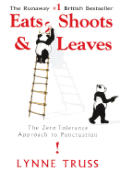
| Publisher: | Gotham |
| Copyright: | 2003 |
| Printing: | April 2004 |
| ISBN: | 1-592-40087-6 |
| Format: | Hardcover |
| Pages: | 209 |
This book made quite a splash in the United States a few months back (and apparently a bit earlier in Britain), but even with all of the coverage I had a hard time working out what to expect. Reviews made clear that it's funny and it's about punctuation; the rest was a bit mysterious. A history of punctuation? A usage guide with humor?
Neither, really. Eats, Shoots & Leaves is an extended rant. There are tidbits of history and a modicum of usage guide included, but mostly to set up parts of the rant. Truss has an entertaining, slightly over-the-top style filled with witty comments and asides, and had me laughing out loud at many points. It also made the book a bit more forgettable than I was hoping it would be.
Any long-time reader of Usenet will need a touch of patience for the opening section on apostrophes, mostly devoted to the "its" vs. "it's" confusions that have been the topic of Usenet flames for decades. I found the apostrophe and comma rants the least interesting, although Truss is always amusing even when talking about things I already know and have seen discussed to death. When she moves on to semicolons, colons, dashes, and the like, I was much more interested; your mileage may vary if you've not read as many grammar books as I have or seen the rules for commas as many times as I have.
I applaud Truss's decision to mostly avoid attempting to be a usage guide, commenting only on points of usage where she has an amusing illustration or a relevant rant. I wish there had been more history of punctuation, though, as the tidbits here were fascinating but all too brief. She spends more time talking about unusual opinions about punctuation held by recent famous writers, an interesting topic but mostly a set of amusing anecdotes rather than anything particularly informative.
Eats, Shoots & Leaves is also unfortunately short. I could have done with another few chapters, and I think she had material for it. Capitalization is mentioned a few times, but a full chapter on it would have been interesting, particularly combined with historical information. A chapter on some of the more obscure punctuation marks (percent, ampersand, at-sign, asterisk) would also have been interesting, although I suppose those are far less frequently misused and wouldn't have fit into the rant as well. I think spacing would also be ripe for several rants, although given Truss's acceptance of interword spacing between sentences, perhaps she doesn't agree. HTML seems to be destroying the last of that convention, and not even I can be bothered to fix text converted from web pages (most of the time).
On-line communication gets the brunt of Truss's ire in causing the downfall of proper punctuation, and on this score I have to agree somewhat but disagree with some of her peeves. It amazes me too the amount of poorly written, misspelled, hideously punctuated, unreadable nonsense people are willing to write even in professional e-mail messages, although compared to top-posting and excessive, confused quoting, a few misplaced apostrophes seem minor. Ignoring a few typos and omitted words in casual e-mail is one thing, but some people seem to have refused all responsibility for making their communications readable.
However, on the subject of smileys (which Truss dislikes intensely) and some of the emphasis techniques in on-line communication (like putting asterisks around words), I have to disagree. She decries both practices as essentially cop-outs, a refusal by the author to choose expressive words and appropriate phrasing and instead just sprinkling in ambiguous symbols and expecting the reader to figure out what they're supposed to mean. While some people do that, and some of the idioms make me cringe (such as the despicable LOL), choosing just the right phrasing to convey emotional tone is quite difficult and more effort than I think it's reasonable to expect people to put into casual communication. I personally use two writing styles depending on formality: for papers or messages for broad dissemination, I avoid casual punctuation; but for typical e-mail and Usenet postings, I attempt to match my writing to the tone of voice that I would use when speaking. Emphasized words reflect how I would emphasize speech. Smileys are indeed ambiguous since rather than using them for a particular purpose, I use them simply when I would be smiling when speaking. (Adding other interjections as words, such as *heh* or *grin*, provides clearer cues than increasingly odd variant smilies.) The result adds some of the abundance of emotional cues provided by in-person speech and does much to allow more accurate guessing of intended emotional tone in prose that's not particularly polished.
That disagreement aside, Truss's rant is quite enjoyable for punctuation pedants and possibly informative for those who haven't read more grammar rulebooks than they can remember. She has an excellent sarcastic and frustrated voice. I wish it had been a bit more than a rant, since as a result it's rather forgettable, but it's great fun to read. Recommended.
Reviewed: 2005-02-21